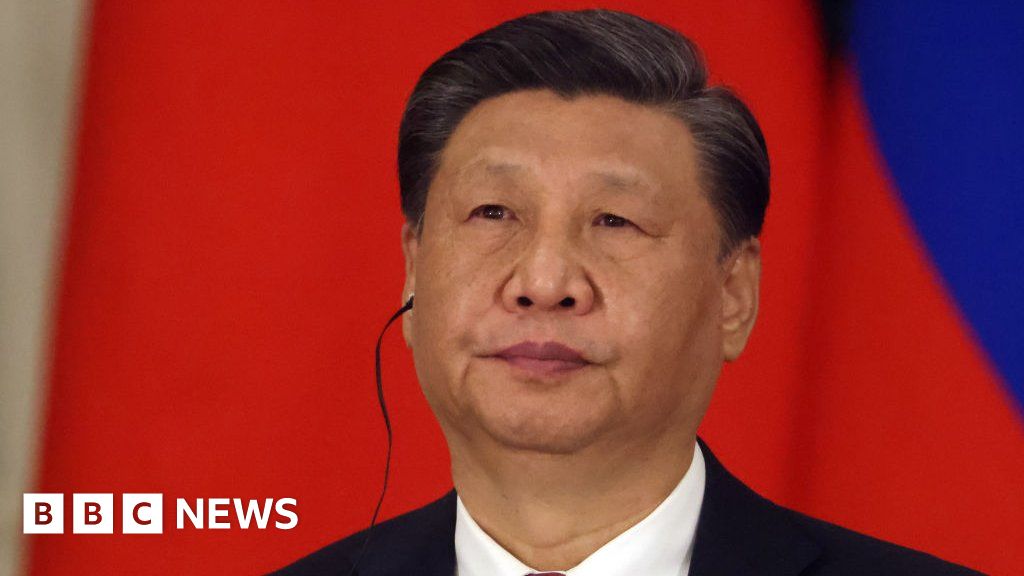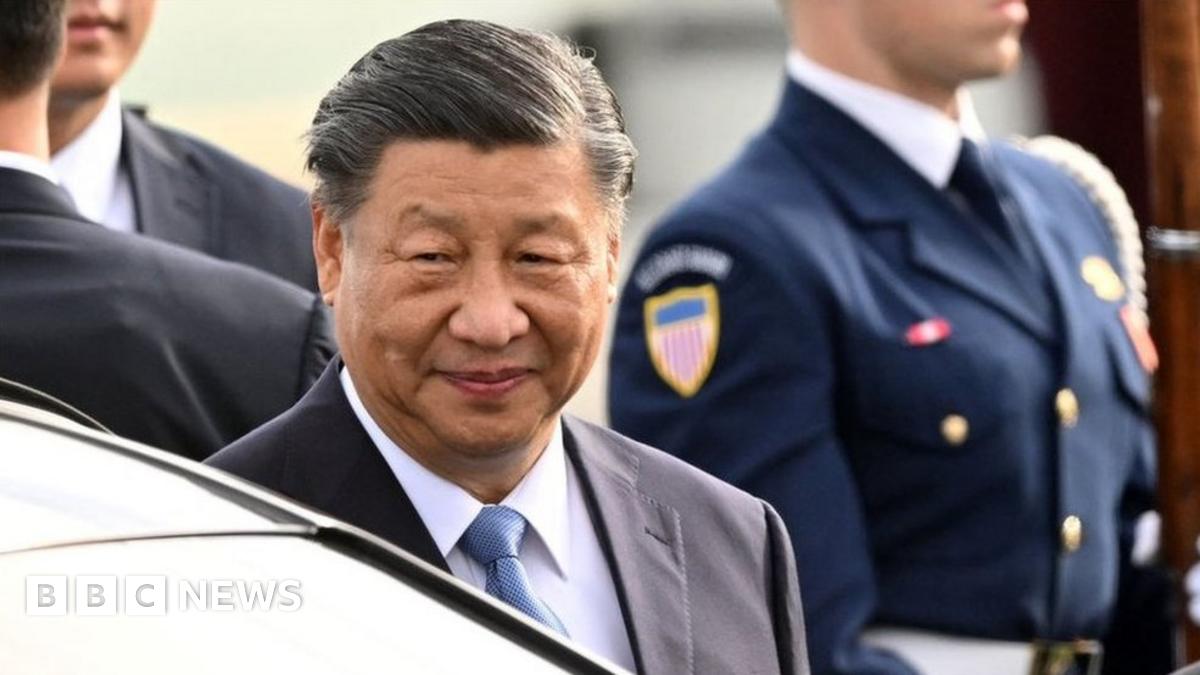- Joined
- Oct 2, 2004
- Runs
- 217,977
China's President Xi Jinping signalled there would be no immediate loosening of his controversial zero-Covid strategy as a historic Communist Party congress opened in Beijing.
In a break in decades-long tradition, delegates are likely to hand Mr Xi a third term as party chief.
Zero-Covid was a "people's war to stop the spread of the virus", he said.
The policy has saved lives, but also exacted a punishing toll on the Chinese people and economy.
There is increasing public fatigue over lockdowns and travel restrictions.
Beijing has come under strict security measures ahead of the congress, sparking frustration in the city with a rare and dramatic public protest on Thursday criticising Mr Xi and zero Covid.
Mr Xi also addressed the issue of Taiwan - which China claims as part of its territory. Self-governing Taiwan sees itself as distinct from the mainland.
Speaking slowly and deliberately, he said Beijing would "never promise to renounce the use of force" and that "complete reunification of our country must and will be realised", prompting sustained applause from delegates.
On Hong Kong, Mr Xi said Beijing had exerted control there, turning the situation from "chaos to governance". Beijing imposed a sweeping national security law on the territory after pro-democracy demonstrations in 2019.
Mr Xi also made reference to divisions within China's political establishment, saying his rule had "removed serious hidden dangers in the party".
Since reaching top office, he has overseen a wide-reaching corruption crackdown extending to the highest echelons of the party. But critics have portrayed it as a political purge.
He also added that China would accelerate the building of its military, referencing the terms "safety" or "security" some 73 times.
The speech, which lasted less than two hours, was significantly shorter than his speech at the last congress in 2017.
His remarks have likely had their choice of words workshopped for months and analysts will be poring over it for any signs of policy shifts.
A third term as leader of the Chinese Communist Party (CCP) will pave the way for him to become the most powerful leader since Mao Zedong.
About 2,300 delegates are meeting to elect party leaders and debate key policies.
Over the course of the congress, delegates are also expected to elect various leaders including the Politburo Standing Committee - China's equivalent of a presidential cabinet - who will present themselves to waiting media after the congress.
In the past, the twice-a-decade congress was seen as a chance for leaders to promote their supporters, as they vied to increase the power of their factions within the party.
But observers say these days there appears to be only one faction at the 20th Party Congress - that of Mr Xi.
In a clear sign of this consolidation of power, top Chinese Communist Party (CCP) leaders released a communiqué days earlier endorsing him as "the core" of the party and leadership. They also called for the party to unite even more closely behind him.
Mr Xi currently holds the three most powerful positions in China - general secretary of the CCP, chairman of the country's armed forces and president. He is expected to renew his term for the first two titles at the congress.
The CCP does not set any term limits. But no leader besides Mao, the founder of communist China, has ever served a third term.
The presidency also used to have a two-term limit in the country's constitution, put in place by reformer Deng Xiaoping to prevent the rise of a Mao-like figure.
But Mr Xi has managed to eliminate this requirement: in 2018 China's rubber-stamp parliament abolished the rule, effectively allowing him to remain president for as long as he likes.
Since taking power in 2012, Mr Xi has led China on a path that has been equal parts ambitious and authoritarian.
He has pushed for "a great rejuvenation of the Chinese nation", which saw him pursuing economic reform, reducing pollution and alleviating poverty.
He has also launched crackdowns on the Uyghurs in Xinjiang and pro-democracy protesters in Hong Kong.
But Mr Xi continues to face a multitude of challenges, such as youth unemployment, a slowing economy and the ongoing property crisis - and of course zero-Covid.
How zero-Covid is spoiling Xi's party
Many will also be watching the congress to see if there will be any alteration to Beijing's foreign policy, especially towards the world's other superpower, the US.
Mr Xi's attempts to expand China's influence abroad through the One Belt One Road programme and claims in the South China Sea, as well as its support of Russia in the Ukraine war and its recent military exercises around Taiwan have raised tensions with the US and other countries.
With Mr Xi remaining at the helm all these will continue to be core interests - though some experts believe he may temper China's approach in some aspects to pursue better trade relations with the US and regional partners.
"The CCP's political legitimacy lies in socioeconomic delivery," said Dr Collin Koh of Singapore's S Rajaratnam School of International Studies.
"The average Chinese citizen will feel that things are not going very well, so there's a need to reinvigorate the kind of growth China has been more used to in recent decades."
In a break in decades-long tradition, delegates are likely to hand Mr Xi a third term as party chief.
Zero-Covid was a "people's war to stop the spread of the virus", he said.
The policy has saved lives, but also exacted a punishing toll on the Chinese people and economy.
There is increasing public fatigue over lockdowns and travel restrictions.
Beijing has come under strict security measures ahead of the congress, sparking frustration in the city with a rare and dramatic public protest on Thursday criticising Mr Xi and zero Covid.
Mr Xi also addressed the issue of Taiwan - which China claims as part of its territory. Self-governing Taiwan sees itself as distinct from the mainland.
Speaking slowly and deliberately, he said Beijing would "never promise to renounce the use of force" and that "complete reunification of our country must and will be realised", prompting sustained applause from delegates.
On Hong Kong, Mr Xi said Beijing had exerted control there, turning the situation from "chaos to governance". Beijing imposed a sweeping national security law on the territory after pro-democracy demonstrations in 2019.
Mr Xi also made reference to divisions within China's political establishment, saying his rule had "removed serious hidden dangers in the party".
Since reaching top office, he has overseen a wide-reaching corruption crackdown extending to the highest echelons of the party. But critics have portrayed it as a political purge.
He also added that China would accelerate the building of its military, referencing the terms "safety" or "security" some 73 times.
The speech, which lasted less than two hours, was significantly shorter than his speech at the last congress in 2017.
His remarks have likely had their choice of words workshopped for months and analysts will be poring over it for any signs of policy shifts.
A third term as leader of the Chinese Communist Party (CCP) will pave the way for him to become the most powerful leader since Mao Zedong.
About 2,300 delegates are meeting to elect party leaders and debate key policies.
Over the course of the congress, delegates are also expected to elect various leaders including the Politburo Standing Committee - China's equivalent of a presidential cabinet - who will present themselves to waiting media after the congress.
In the past, the twice-a-decade congress was seen as a chance for leaders to promote their supporters, as they vied to increase the power of their factions within the party.
But observers say these days there appears to be only one faction at the 20th Party Congress - that of Mr Xi.
In a clear sign of this consolidation of power, top Chinese Communist Party (CCP) leaders released a communiqué days earlier endorsing him as "the core" of the party and leadership. They also called for the party to unite even more closely behind him.
Mr Xi currently holds the three most powerful positions in China - general secretary of the CCP, chairman of the country's armed forces and president. He is expected to renew his term for the first two titles at the congress.
The CCP does not set any term limits. But no leader besides Mao, the founder of communist China, has ever served a third term.
The presidency also used to have a two-term limit in the country's constitution, put in place by reformer Deng Xiaoping to prevent the rise of a Mao-like figure.
But Mr Xi has managed to eliminate this requirement: in 2018 China's rubber-stamp parliament abolished the rule, effectively allowing him to remain president for as long as he likes.
Since taking power in 2012, Mr Xi has led China on a path that has been equal parts ambitious and authoritarian.
He has pushed for "a great rejuvenation of the Chinese nation", which saw him pursuing economic reform, reducing pollution and alleviating poverty.
He has also launched crackdowns on the Uyghurs in Xinjiang and pro-democracy protesters in Hong Kong.
But Mr Xi continues to face a multitude of challenges, such as youth unemployment, a slowing economy and the ongoing property crisis - and of course zero-Covid.
How zero-Covid is spoiling Xi's party
Many will also be watching the congress to see if there will be any alteration to Beijing's foreign policy, especially towards the world's other superpower, the US.
Mr Xi's attempts to expand China's influence abroad through the One Belt One Road programme and claims in the South China Sea, as well as its support of Russia in the Ukraine war and its recent military exercises around Taiwan have raised tensions with the US and other countries.
With Mr Xi remaining at the helm all these will continue to be core interests - though some experts believe he may temper China's approach in some aspects to pursue better trade relations with the US and regional partners.
"The CCP's political legitimacy lies in socioeconomic delivery," said Dr Collin Koh of Singapore's S Rajaratnam School of International Studies.
"The average Chinese citizen will feel that things are not going very well, so there's a need to reinvigorate the kind of growth China has been more used to in recent decades."










